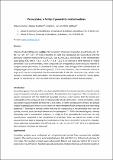Files in this item
Perovzalates : a family of perovskite-related oxalates
Item metadata
| dc.contributor.author | Clulow, Rebecca | |
| dc.contributor.author | Bradford, Alasdair J. | |
| dc.contributor.author | Lee, Stephen L. | |
| dc.contributor.author | Lightfoot, Philip | |
| dc.date.accessioned | 2020-09-05T23:35:22Z | |
| dc.date.available | 2020-09-05T23:35:22Z | |
| dc.date.issued | 2019-10-14 | |
| dc.identifier | 261743908 | |
| dc.identifier | 4c54002c-2f0e-441e-abe6-f25446785782 | |
| dc.identifier | 85072790748 | |
| dc.identifier | 31524905 | |
| dc.identifier | 000488472000024 | |
| dc.identifier.citation | Clulow , R , Bradford , A J , Lee , S L & Lightfoot , P 2019 , ' Perovzalates : a family of perovskite-related oxalates ' , Dalton Transactions , vol. 48 , no. 38 , pp. 14461-14466 . https://doi.org/10.1039/c9dt03149a | en |
| dc.identifier.issn | 1477-9226 | |
| dc.identifier.other | ORCID: /0000-0001-7048-3982/work/63044377 | |
| dc.identifier.other | ORCID: /0000-0002-2020-3310/work/63044685 | |
| dc.identifier.other | ORCID: /0000-0002-0096-4366/work/63046014 | |
| dc.identifier.uri | https://hdl.handle.net/10023/20570 | |
| dc.description | Authors would like to thank the University of St Andrews (studentship to AJB) and the EPSRC (doctoral studentship to RC: DTG012 EP/K503162-1) for funding. | en |
| dc.description.abstract | A family of hybrid Perovskite-oxalates (“Perovzalates”) of general composition AILi3MII(C2O4)3 (A = K+, Rb+, Cs+; M = Fe2+, Co2+, Ni2+) are presented. All eight new compounds are isostructural with the previously reported examples NH4Li3Fe(C2O4)3 and KLi3Fe(C2O4)3, crystallising in the rhombohedral space group Rc, with a ∼11.3–11.6 Å, c ∼14.8–15.2 Å. In contrast to other families of “hybrid perovskites” such as the formates, these compounds can be regarded as closer structural relatives to inorganic (oxide) perovskites, in the sense that they contain direct linkages of the octahedral sites via bridging oxygen atoms (of the oxalate groups). It is of note, therefore, that monoatomic cations as large as Cs+ can be incorporated into the perovskite-like A sites of this structure type, which is not feasible in traditional ABO3 perovskites; indeed CsLi3Ni(C2O4)3 appears to exhibit the ‘mostly tightly bound’ 12-coordinate Cs+ ion in an oxide environment, according to a bond valence analysis. | |
| dc.format.extent | 6 | |
| dc.format.extent | 887397 | |
| dc.language.iso | eng | |
| dc.relation.ispartof | Dalton Transactions | en |
| dc.subject | QD Chemistry | en |
| dc.subject | Inorganic Chemistry | en |
| dc.subject | DAS | en |
| dc.subject.lcc | QD | en |
| dc.title | Perovzalates : a family of perovskite-related oxalates | en |
| dc.type | Journal article | en |
| dc.contributor.institution | University of St Andrews. School of Chemistry | en |
| dc.contributor.institution | University of St Andrews. School of Physics and Astronomy | en |
| dc.contributor.institution | University of St Andrews. Centre for Designer Quantum Materials | en |
| dc.contributor.institution | University of St Andrews. Condensed Matter Physics | en |
| dc.contributor.institution | University of St Andrews. EaSTCHEM | en |
| dc.identifier.doi | 10.1039/c9dt03149a | |
| dc.description.status | Peer reviewed | en |
| dc.date.embargoedUntil | 2020-09-06 |
This item appears in the following Collection(s)
Items in the St Andrews Research Repository are protected by copyright, with all rights reserved, unless otherwise indicated.

